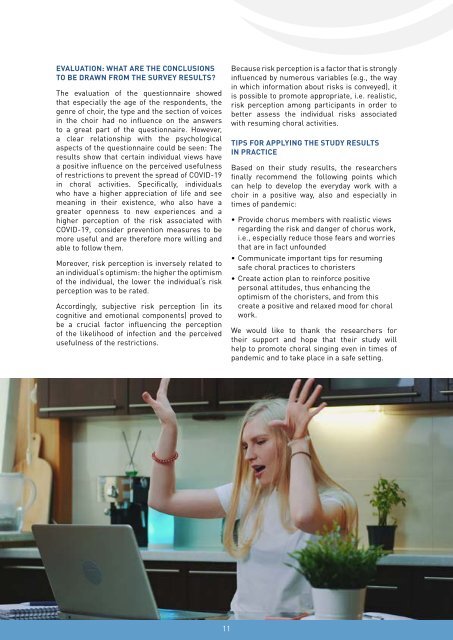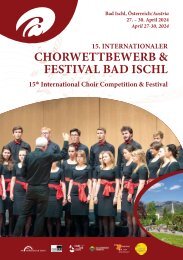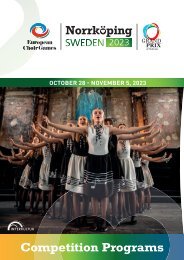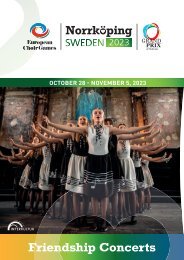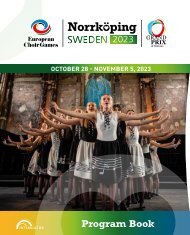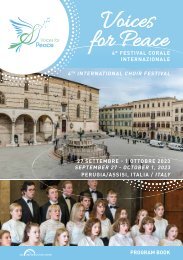COUNCIL TALK 02/2021 - The digital magazine of the World Choir Council
The digital magazine COUNCIL TALK is the magazine of the INTERKULTUR World Choir Council – in exchange with the choir world. It is published twice a year at the end of January and August. In addition to reviews of the projects and meetings of the World Choir Council, the magazine focuses primarily on current issues and challenges of the choral scene.
The digital magazine COUNCIL TALK is the magazine of the INTERKULTUR World Choir Council – in exchange with the choir world. It is published twice a year at the end of January and August.
In addition to reviews of the projects and meetings of the World Choir Council, the magazine focuses primarily on current issues and challenges of the choral scene.
- No tags were found...
Create successful ePaper yourself
Turn your PDF publications into a flip-book with our unique Google optimized e-Paper software.
EVALUATION: WHAT ARE THE CONCLUSIONS<br />
TO BE DRAWN FROM THE SURVEY RESULTS?<br />
<strong>The</strong> evaluation <strong>of</strong> <strong>the</strong> questionnaire showed<br />
that especially <strong>the</strong> age <strong>of</strong> <strong>the</strong> respondents, <strong>the</strong><br />
genre <strong>of</strong> choir, <strong>the</strong> type and <strong>the</strong> section <strong>of</strong> voices<br />
in <strong>the</strong> choir had no influence on <strong>the</strong> answers<br />
to a great part <strong>of</strong> <strong>the</strong> questionnaire. However,<br />
a clear relationship with <strong>the</strong> psychological<br />
aspects <strong>of</strong> <strong>the</strong> questionnaire could be seen: <strong>The</strong><br />
results show that certain individual views have<br />
a positive influence on <strong>the</strong> perceived usefulness<br />
<strong>of</strong> restrictions to prevent <strong>the</strong> spread <strong>of</strong> COVID-19<br />
in choral activities. Specifically, individuals<br />
who have a higher appreciation <strong>of</strong> life and see<br />
meaning in <strong>the</strong>ir existence, who also have a<br />
greater openness to new experiences and a<br />
higher perception <strong>of</strong> <strong>the</strong> risk associated with<br />
COVID-19, consider prevention measures to be<br />
more useful and are <strong>the</strong>refore more willing and<br />
able to follow <strong>the</strong>m.<br />
Moreover, risk perception is inversely related to<br />
an individual‘s optimism: <strong>the</strong> higher <strong>the</strong> optimism<br />
<strong>of</strong> <strong>the</strong> individual, <strong>the</strong> lower <strong>the</strong> individual‘s risk<br />
perception was to be rated.<br />
Accordingly, subjective risk perception (in its<br />
cognitive and emotional components) proved to<br />
be a crucial factor influencing <strong>the</strong> perception<br />
<strong>of</strong> <strong>the</strong> likelihood <strong>of</strong> infection and <strong>the</strong> perceived<br />
usefulness <strong>of</strong> <strong>the</strong> restrictions.<br />
Because risk perception is a factor that is strongly<br />
influenced by numerous variables (e.g., <strong>the</strong> way<br />
in which information about risks is conveyed), it<br />
is possible to promote appropriate, i.e. realistic,<br />
risk perception among participants in order to<br />
better assess <strong>the</strong> individual risks associated<br />
with resuming choral activities.<br />
TIPS FOR APPLYING THE STUDY RESULTS<br />
IN PRACTICE<br />
Based on <strong>the</strong>ir study results, <strong>the</strong> researchers<br />
finally recommend <strong>the</strong> following points which<br />
can help to develop <strong>the</strong> everyday work with a<br />
choir in a positive way, also and especially in<br />
times <strong>of</strong> pandemic:<br />
• Provide chorus members with realistic views<br />
regarding <strong>the</strong> risk and danger <strong>of</strong> chorus work,<br />
i.e., especially reduce those fears and worries<br />
that are in fact unfounded<br />
• Communicate important tips for resuming<br />
safe choral practices to choristers<br />
• Create action plan to reinforce positive<br />
personal attitudes, thus enhancing <strong>the</strong><br />
optimism <strong>of</strong> <strong>the</strong> choristers, and from this<br />
create a positive and relaxed mood for choral<br />
work.<br />
We would like to thank <strong>the</strong> researchers for<br />
<strong>the</strong>ir support and hope that <strong>the</strong>ir study will<br />
help to promote choral singing even in times <strong>of</strong><br />
pandemic and to take place in a safe setting.<br />
11


